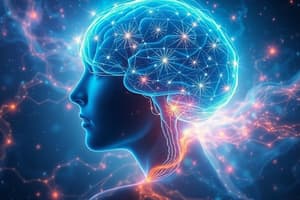Podcast
Questions and Answers
Cosa si intende per neuroplasticità?
Cosa si intende per neuroplasticità?
- La capacità del cervello di creare e modificare connessioni neuronali (correct)
- Il processo di formazione di nuovi neuroni nel cervello
- La rigidità delle connessioni neuronali dopo la nascita
- La degradazione delle connessioni neuronali con l'età
Quale parte del cervello svolge un ruolo cruciale nella formazione della memoria?
Quale parte del cervello svolge un ruolo cruciale nella formazione della memoria?
- L'ippocampo (correct)
- Il talamo
- Il cervelletto
- Il bulbo olfattivo
Cosa accade quando incontriamo una nuova situazione o esperienza?
Cosa accade quando incontriamo una nuova situazione o esperienza?
- Il nostro cervello crea nuove connessioni neuronali per ricordarla (correct)
- Il nostro cervello elimina le connessioni neuronali esistenti
- Il nostro cervello indebolisce le connessioni neuronali esistenti
- Il nostro cervello non subisce alcun cambiamento
Come si rafforzano le connessioni neuronali legate alla memoria?
Come si rafforzano le connessioni neuronali legate alla memoria?
Qual è la relazione tra apprendimento e neuroplasticità?
Qual è la relazione tra apprendimento e neuroplasticità?
Cosa accade alle connessioni neuronali quando si verifica un apprendimento?
Cosa accade alle connessioni neuronali quando si verifica un apprendimento?
Quali di questi fattori contribuiscono a migliorare la neuroplasticità e la formazione della memoria?
Quali di questi fattori contribuiscono a migliorare la neuroplasticità e la formazione della memoria?
Quale affermazione è falsa riguardo alla neuroplasticità e alla formazione della memoria?
Quale affermazione è falsa riguardo alla neuroplasticità e alla formazione della memoria?
Cosa avviene quando i neuroni si attivano insieme durante la formazione della memoria?
Cosa avviene quando i neuroni si attivano insieme durante la formazione della memoria?
Quale di questi è un potenziale beneficio dell'approfittare della neuroplasticità del cervello?
Quale di questi è un potenziale beneficio dell'approfittare della neuroplasticità del cervello?
Quale di queste affermazioni descrive correttamente il ruolo della neuroplasticità nella formazione della memoria?
Quale di queste affermazioni descrive correttamente il ruolo della neuroplasticità nella formazione della memoria?
Quale di queste affermazioni riguardo alla neuroplasticità è falsa?
Quale di queste affermazioni riguardo alla neuroplasticità è falsa?
Flashcards are hidden until you start studying
Study Notes
Memory Formation and Neuroplasticity
Memory formation is a complex process involving multiple aspects of the brain, one of which is neuroplasticity. Neuroplasticity refers to the brain's ability to learn and adapt, allowing for the creation and modification of neural connections, especially in response to experience and environmental events.
What is Neuroplasticity?
Neuroplasticity means that the brain has the capacity to change and is not fixed from birth. It involves the creation of new neural connections, the elimination of others, and the strengthening or weakening of existing links between neurons, depending on the experiences and activities of the individual.
The Impact of Neuroplasticity on Memory Formation
Neuroplasticity plays a crucial role in memory formation because it allows the brain to store, retrieve, and update memories according to new information. When we encounter a new situation or experience, our brain creates new neural connections to remember it. Over time, these connections become stronger through repeated exposure to similar situations, resulting in increased efficiency in recognizing and responding to them.
This process is fundamentally connected to learning, which involves acquiring knowledge and skills. Learning leads to modifications in neural connections in various parts of the brain, such as the hippocampus, where memory formation primarily takes place. These changes occur when neurons fire together, creating new pathways that reinforce specific memories.
Additionally, neuroplasticity helps maintain cognitive abilities as we age. Although the number of neurons in certain brain regions may decrease with age, the connections between neurons remain active and adaptable, enabling us to continue learning and retaining new information.
Enhancing Neuroplasticity for Better Memory Formation
As our understanding of neuroplasticity continues to evolve, strategies to enhance memory formation and cognitive function are being developed. Some of these techniques involve engaging in mentally challenging tasks, practicing mindfulness meditation, obtaining adequate sleep, and maintaining physical exercise routines.
These practices can help create conditions conducive to neuroplasticity and promote the growth of new neural connections, thereby improving memory formation and overall brain health. Furthermore, by taking advantage of our brain's natural ability to learn and adapt, we can potentially slow down or even reverse age-related cognitive decline.
In summary, neuroplasticity is a vital aspect of memory formation, allowing the brain to adapt, learn, and retain information. By fostering conditions that encourage neuroplasticity, we can enhance our cognitive abilities and maintain optimal brain health throughout our lives.
Studying That Suits You
Use AI to generate personalized quizzes and flashcards to suit your learning preferences.




